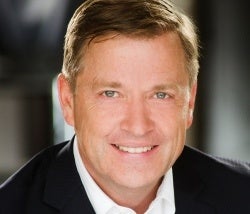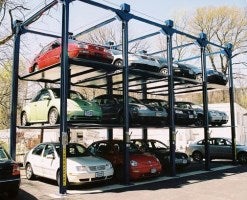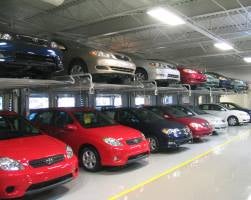 Parking is a puzzle that Phil Harding loves to solve. It takes a certain type of mind to look at the tons of metal (and other materials) that make up modern cars and think about how to stack them one on top of the other. Phil Harding honed his mind earning his Chemistry degree from CU Denver, and he says, "Chemistry taught me to think about problems differently. For most people parking is a two-dimensional problem, for my company it's in three dimensions."
Parking is a puzzle that Phil Harding loves to solve. It takes a certain type of mind to look at the tons of metal (and other materials) that make up modern cars and think about how to stack them one on top of the other. Phil Harding honed his mind earning his Chemistry degree from CU Denver, and he says, "Chemistry taught me to think about problems differently. For most people parking is a two-dimensional problem, for my company it's in three dimensions."
After receiving his Chemistry BS in 1986 Harding was accepted to both medical school at Creighton University and law school at the University of Denver. His plan was to do a JD/MD, starting with the law degree, but during his first year at DU he began working for his father's company, Harding Steel.
Anyone who has tried to park on the Auraria campus (or in downtown Denver, for that matter) can appreciate what Harding's company does: creates space by building and installing the machinery that makes stacked parking possible. Harding Steel's major operations and warehouse are on the East Coast, where the densely-packed cities build far more parking lifts, but as a Colorado native Harding chose to keep the corporate operations in Denver's thriving downtown. The parking lift business is a small industry, dominated by Harding Steel and one other company. While the demand for mechanical parking lifts in and around Denver remains small, Harding Steel travels the world to help design and build complex parking systems.
Named Chairman and CEO of Harding Steel in 1999, Phil Harding has also raised his family and grown a thriving legal practice in his hometown. He oversees the legal, financial, contracting, and corporate marketing functions at Harding Steel, while continuing to practice law as a Partner in Harding and Associates, PC. Many people recognize him from the local KWGN's show Colorado's Best, where he gives regular legal advice on a variety of topics. The National Trial Lawyer's Association has named Harding one of the Top 100 Trial Lawyers in Colorado eight years in a row. Holding down two careers isn't for everyone, but for Harding, "It's actually great, because when you're doing your job and you get tired of doing one thing you get to switch and do something else."
Harding sums up the mission of Harding Steel succinctly: "We turn air space into parking space. People know to come to us when they have issues, and we provide solutions to developers that say things like, 'I've gotta get 500 cars in here, and if I can't do that I have to buy so much more land.'"
 In his CEO hat, Harding uses his three-dimensional way of thinking to come up with solutions that 1) work for customers 2) utilize up-to-date technologies, and 3) utilize the strengths of his team. He says, "if you focus on thinking creatively, and you really find out about people's goals when you are researching solutions, you're gonna find the answers that others won't." He says he still enjoys the challenges that both his professions present, because he never wants to stop learning, developing, and helping people.
In his CEO hat, Harding uses his three-dimensional way of thinking to come up with solutions that 1) work for customers 2) utilize up-to-date technologies, and 3) utilize the strengths of his team. He says, "if you focus on thinking creatively, and you really find out about people's goals when you are researching solutions, you're gonna find the answers that others won't." He says he still enjoys the challenges that both his professions present, because he never wants to stop learning, developing, and helping people.
In the years since Harding took over his company he has been innovating new ways to expand mechanical parking systems. Partnerships with firms from Italy and Germany have allowed Harding Steel to import innovations from across the globe. An up-and-coming market is in solutions for homes—Harding's COO Jim Myers came up with a new way for homeowners to install an underground system for parking in residential garages into extended basement space. A patented lift system created by Harding Steel allows the operations to lift luxury vehicles down further underground. Harding says, "Think bat-cave. Once you break the sound barrier of 'we are gonna stack cars' you can do whatever you want."
Harding says that over the course of his career the public's thinking about vertical parking has been expanded by seeing the possibilities of three-dimensional thinking put into action. He says that forty years ago first-time customers in New York City would see the lift systems and tip valets extra asking them NOT to put their cars up in the air. But now, he says owners realize that when their car is elevated there is no chance for theft, and no door dings, and people have started tipping extra to have their cars stashed safely away in the lifts. Harding knows that cars are safer in his products because he, along with executives from the other major mechanical parking company in the US, helped draft regulations for mechanical parking in New York City.
While it took some time for the general public to get used to Harding's three-dimensional approach to parking, he learned early that thinking outside the box could be a great way to get ahead. Harding started taking classes at CU Denver during his senior year at Cherry Creek High School, but went to Boulder for his first year of college because it was seen as a more prestigious option. Despite the hype, Harding says he knew right away that he needed to move his education back downtown, "Denver was so much better," he remembers thinking. "Because people in Denver were so much more serious about learning and serious about going to school. The great thing about CU Denver—faculty and students—is that they are there because they want to be there."
 After transferring back to CU Denver Harding never looked back. "A science degree in any form is so marketable because it teaches you how to think, and how to think logically. It helped me get in and it helped me while I was in law school," he says. "Actually, law schools were fighting to get someone with a science degree. Everyone does political science or something similar to go into law school. Law schools love to see someone with science background because when I've got someone on the stand, especially someone who's an engineer or someone who thinks he can bamboozle me because I'm a lawyer—it doesn't fly," Harding says with a smile.
After transferring back to CU Denver Harding never looked back. "A science degree in any form is so marketable because it teaches you how to think, and how to think logically. It helped me get in and it helped me while I was in law school," he says. "Actually, law schools were fighting to get someone with a science degree. Everyone does political science or something similar to go into law school. Law schools love to see someone with science background because when I've got someone on the stand, especially someone who's an engineer or someone who thinks he can bamboozle me because I'm a lawyer—it doesn't fly," Harding says with a smile.
Taking full advantage of his electives, Harding remembers getting a lot out of the liberal arts side of his education as well. A very influential professor for him was Glenn Morris of Political Science. Harding remembers specific principles about the law he learned in Morris's classes close to 30 years ago. Professor Morris opened his eyes up to the impacts of the law and, in his words, "what's fair and what's right."
Today Harding's business mantra is simple: "Do what you are hired to do in an ethical way." He says having your code of ethics held firmly in place is critical for anyone, because, "In business people remember what you do. Denver seems big, but it's really not. The community is small. And if you do something that's not right people are going to know about it." Harding says after all his years in business people come back to him long after his actions have had an impact and tell him that they remember the good things he's done. This is his definition of success.
